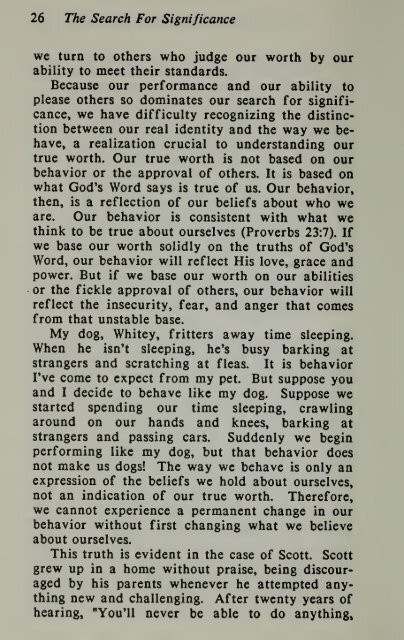The Search for Significance
Robert McGee's best-selling book has helped millions of readers learn how to be free to enjoy Christ's love while no longer basing their self-worth on their accomplishments or the opinions of others. In fact, Billy Graham said that it was a book that "should be read by every Christian." In this timeless classic you will: Gain new skills for getting off the performance treadmill Discover how four false beliefs have negatively impacted your life Learn how to overcome obstacles that prevent you from experiencing the truth that your self-worth is found only in the love, acceptance, and forgiveness of Christ
Robert McGee's best-selling book has helped millions of readers learn how to be free to enjoy Christ's love while no longer basing their self-worth on their accomplishments or the opinions of others. In fact, Billy Graham said that it was a book that "should be read by every Christian."
In this timeless classic you will:
Gain new skills for getting off the performance treadmill
Discover how four false beliefs have negatively impacted your life
Learn how to overcome obstacles that prevent you from experiencing the truth that your self-worth is found only in the love, acceptance, and forgiveness of Christ
You also want an ePaper? Increase the reach of your titles
YUMPU automatically turns print PDFs into web optimized ePapers that Google loves.
26 <strong>The</strong> <strong>Search</strong> For <strong>Significance</strong><br />
we turn to others who judge our worth by our<br />
ability to meet their standards.<br />
Because our per<strong>for</strong>mance and our ability to<br />
please others so dominates our search <strong>for</strong> significance,<br />
we have difficulty recognizing the distinction<br />
between our real identity and the way we behave,<br />
a realization crucial to understanding our<br />
true worth. Our true worth is not based on our<br />
behavior or the approval of others. It is based on<br />
what God's Word says is true of us. Our behavior,<br />
then, is a reflection of our beliefs about who we<br />
are. Our behavior is consistent with what we<br />
think to be true about ourselves (Proverbs 23:7). If<br />
we base our worth solidly on the truths of God's<br />
Word, our behavior will reflect His love, grace and<br />
power. But if we base our worth on our abilities<br />
or the fickle approval of others, our behavior will<br />
reflect the insecurity, fear, and anger that comes<br />
from that unstable base.<br />
My dog, Whitey, fritters away time sleeping.<br />
When he isn't sleeping, he's busy barking at<br />
strangers and scratching at fleas. It is behavior<br />
I've come to expect from my pet. But suppose you<br />
and I decide to behave like my dog. Suppose we<br />
started spending our time sleeping, crawling<br />
around on our hands and knees, barking at<br />
strangers and passing cars. Suddenly we begin<br />
per<strong>for</strong>ming like my dog, but that behavior does<br />
not make us dogs! <strong>The</strong> way we behave is only an<br />
expression of the beliefs we hold about ourselves,<br />
not an indication of our true worth. <strong>The</strong>re<strong>for</strong>e,<br />
we cannot experience a permanent change in our<br />
behavior without first changing what we believe<br />
about ourselves.<br />
This truth is evident in the case of Scott. Scott<br />
grew up in a home without praise, being discouraged<br />
by his parents whenever he attempted anything<br />
new and challenging. After twenty years of<br />
hearing, "You'll never be able to do anything,

















